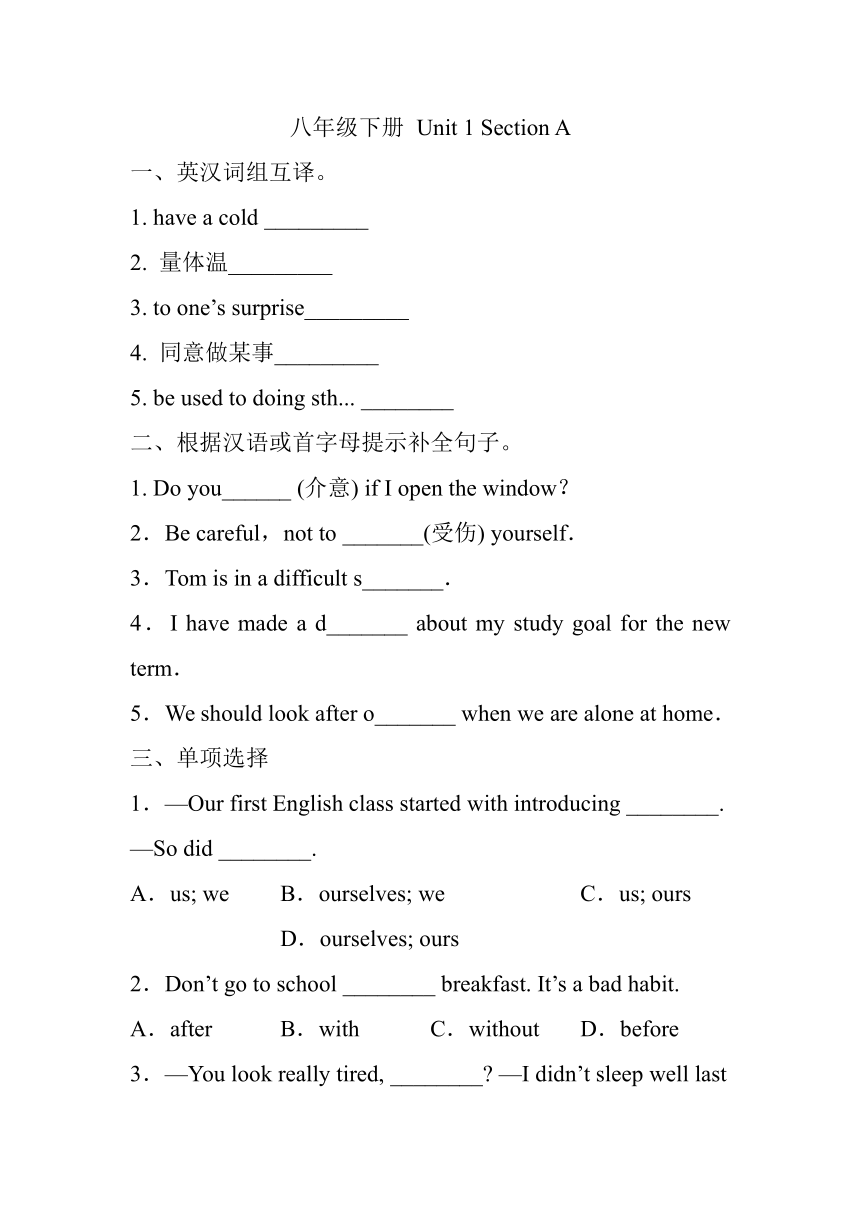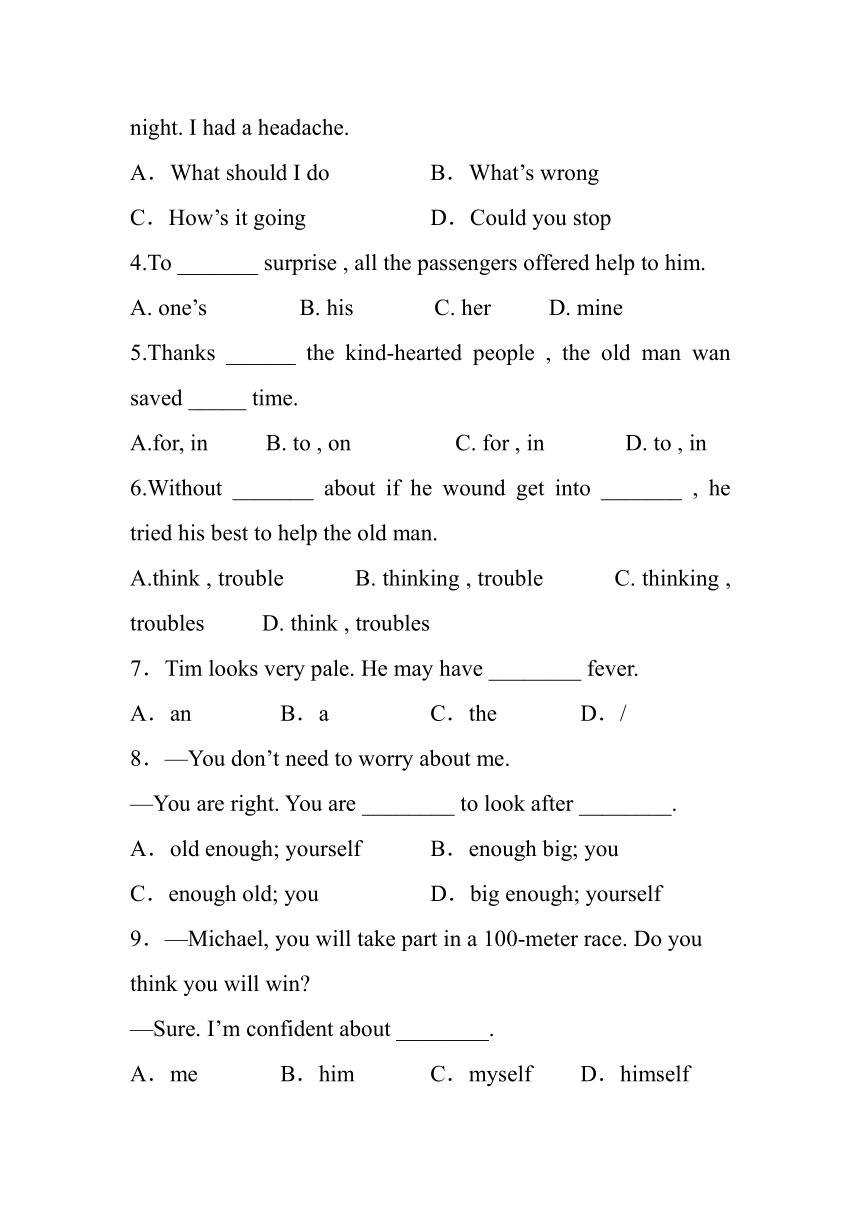人教版八年级下册 Unit 1What's the matter? Section A练习(无答案)
文档属性
| 名称 | 人教版八年级下册 Unit 1What's the matter? Section A练习(无答案) |  | |
| 格式 | zip | ||
| 文件大小 | 16.2KB | ||
| 资源类型 | 教案 | ||
| 版本资源 | 人教新目标(Go for it)版 | ||
| 科目 | 英语 | ||
| 更新时间 | 2023-02-12 23:17:05 | ||
图片预览



文档简介
八年级下册 Unit 1 Section A
一、英汉词组互译。
1. have a cold _________
2. 量体温_________
3. to one’s surprise_________
4. 同意做某事_________
5. be used to doing sth... ________
二、根据汉语或首字母提示补全句子。
1. Do you______ (介意) if I open the window?
2.Be careful,not to _______(受伤) yourself.
3.Tom is in a difficult s_______.
4.I have made a d_______ about my study goal for the new term.
5.We should look after o_______ when we are alone at home.
三、单项选择
1.—Our first English class started with introducing ________.
—So did ________.
A.us; we B.ourselves; we C.us; ours D.ourselves; ours
2.Don’t go to school ________ breakfast. It’s a bad habit.
A.after B.with C.without D.before
3.—You look really tired, ________ —I didn’t sleep well last night. I had a headache.
A.What should I do B.What’s wrong
C.How’s it going D.Could you stop
4.To _______ surprise , all the passengers offered help to him.
A. one’s B. his C. her D. mine
5.Thanks ______ the kind-hearted people , the old man wan saved _____ time.
A.for, in B. to , on C. for , in D. to , in
6.Without _______ about if he wound get into _______ , he tried his best to help the old man.
A.think , trouble B. thinking , trouble C. thinking , troubles D. think , troubles
7.Tim looks very pale. He may have ________ fever.
A.an B.a C.the D./
8.—You don’t need to worry about me.
—You are right. You are ________ to look after ________.
A.old enough; yourself B.enough big; you
C.enough old; you D.big enough; yourself
9.—Michael, you will take part in a 100-meter race. Do you think you will win
—Sure. I’m confident about ________.
A.me B.him C.myself D.himself
10.—Help ________ to some strawberries, kids.
—Thanks, Ms.White.
A.yourselves B.yourself C.themselves
四、完形填空
Bryan was driving his car when he saw an old lady. The lady stood on the side of the road. She needed help. Bryan __1__ his car near her car and went out.
Bryan smiled(微笑) when he was walking up to her. The lady was __2__, because no one stopped for hours. Also Bryan __3__ poor and hungry; she didn't know if he might hurt her. Bryan knew __4__ she felt then. So he said, "I'm here to help __5__.Don't worry. And my name is Bryan Anderson."
The tyre(轮胎) of her car was broken, so Bryan had to go __6__ the car. When changing(更换) the tyre, he got dirty and his hands __7__.
When Bryan finished his __8__, the old lady asked how much she should pay for his help. Bryan smiled and said, "__9__ you really want to pay me back, just help others. Next time you see someone in __10__, give that person the help he needs."
1.A.washed B.stopped C.drove D.rode
2.A.worried B.sick C.famous D.successful
3.A.sounded B.seemed C.saw D.looked
4.A.where B.why C.how D.what
5.A.him B.you C.them D.her
6.A.behind B.under C.into D.onto
7.A.caught B.lost C.swung D.hurt
8.A.job B.meal C.program D.housework
9.A.Though B.Unless C.If D.Because
10.A.Trouble B.space C.risk D.situation
五、阅读理解
Every year, nearly a million children in the world die because of unintentional injuries(意外伤害), and the biggest killer is the traffic accident, according to a report from the Worldwide Health Organization.
The report says that traffic accidents, falling into water, fires, falls, and poisoning(中毒)are the five major causes of unintentional injuries. About 830000 children under 18 die and millions of children are injured every year.
The World Health Organization finds that roads are the most dangerous places for children, especially in developing countries. Because children in these countries haven’t learned about the dangers of road traffic, they are often not ready for the new roads that might be built through their villages.
In Asia, deaths are most often caused by bikes. It is usual to see a whole family on one bike in counties such as Vietnam. When they are knocked over, they will be badly injured and some may even die.
In the United States and other Western countries, injuries from road traffic accidents have been cut down through the use of safety seats for children and other safety measures. However, traffic accidents are still a major cause of deadly(致命的) injuries.
1.How many children die from unintentional injuries in the world every year
A.Nearly a thousand. B.A hundred.
C.A million. D.About a million.
2.How many kinds of unintentional injuries do we learn from the passage
A.3. B.4. C.5. D.6.
3.Where are the most dangerous places according to the passage
A.Roads. B.Rivers. C.Houses. D.Bikes.
4.From the last paragraph we can learn that________.
A.there are no traffic accidents in the United States
B.traffic is a major cause of injuries in the United States
C.there are ways to cut the number of traffic accidents
D.people can only be injured by traffic accidents
5.The passage mainly tells us that __________.
A.fires are more dangerous than falls and falling into water
B.many children die from unintentional injuries every year
C.developing countries have more traffic accidents
D.unintentional injuries happen only in developing countries
一、英汉词组互译。
1. have a cold _________
2. 量体温_________
3. to one’s surprise_________
4. 同意做某事_________
5. be used to doing sth... ________
二、根据汉语或首字母提示补全句子。
1. Do you______ (介意) if I open the window?
2.Be careful,not to _______(受伤) yourself.
3.Tom is in a difficult s_______.
4.I have made a d_______ about my study goal for the new term.
5.We should look after o_______ when we are alone at home.
三、单项选择
1.—Our first English class started with introducing ________.
—So did ________.
A.us; we B.ourselves; we C.us; ours D.ourselves; ours
2.Don’t go to school ________ breakfast. It’s a bad habit.
A.after B.with C.without D.before
3.—You look really tired, ________ —I didn’t sleep well last night. I had a headache.
A.What should I do B.What’s wrong
C.How’s it going D.Could you stop
4.To _______ surprise , all the passengers offered help to him.
A. one’s B. his C. her D. mine
5.Thanks ______ the kind-hearted people , the old man wan saved _____ time.
A.for, in B. to , on C. for , in D. to , in
6.Without _______ about if he wound get into _______ , he tried his best to help the old man.
A.think , trouble B. thinking , trouble C. thinking , troubles D. think , troubles
7.Tim looks very pale. He may have ________ fever.
A.an B.a C.the D./
8.—You don’t need to worry about me.
—You are right. You are ________ to look after ________.
A.old enough; yourself B.enough big; you
C.enough old; you D.big enough; yourself
9.—Michael, you will take part in a 100-meter race. Do you think you will win
—Sure. I’m confident about ________.
A.me B.him C.myself D.himself
10.—Help ________ to some strawberries, kids.
—Thanks, Ms.White.
A.yourselves B.yourself C.themselves
四、完形填空
Bryan was driving his car when he saw an old lady. The lady stood on the side of the road. She needed help. Bryan __1__ his car near her car and went out.
Bryan smiled(微笑) when he was walking up to her. The lady was __2__, because no one stopped for hours. Also Bryan __3__ poor and hungry; she didn't know if he might hurt her. Bryan knew __4__ she felt then. So he said, "I'm here to help __5__.Don't worry. And my name is Bryan Anderson."
The tyre(轮胎) of her car was broken, so Bryan had to go __6__ the car. When changing(更换) the tyre, he got dirty and his hands __7__.
When Bryan finished his __8__, the old lady asked how much she should pay for his help. Bryan smiled and said, "__9__ you really want to pay me back, just help others. Next time you see someone in __10__, give that person the help he needs."
1.A.washed B.stopped C.drove D.rode
2.A.worried B.sick C.famous D.successful
3.A.sounded B.seemed C.saw D.looked
4.A.where B.why C.how D.what
5.A.him B.you C.them D.her
6.A.behind B.under C.into D.onto
7.A.caught B.lost C.swung D.hurt
8.A.job B.meal C.program D.housework
9.A.Though B.Unless C.If D.Because
10.A.Trouble B.space C.risk D.situation
五、阅读理解
Every year, nearly a million children in the world die because of unintentional injuries(意外伤害), and the biggest killer is the traffic accident, according to a report from the Worldwide Health Organization.
The report says that traffic accidents, falling into water, fires, falls, and poisoning(中毒)are the five major causes of unintentional injuries. About 830000 children under 18 die and millions of children are injured every year.
The World Health Organization finds that roads are the most dangerous places for children, especially in developing countries. Because children in these countries haven’t learned about the dangers of road traffic, they are often not ready for the new roads that might be built through their villages.
In Asia, deaths are most often caused by bikes. It is usual to see a whole family on one bike in counties such as Vietnam. When they are knocked over, they will be badly injured and some may even die.
In the United States and other Western countries, injuries from road traffic accidents have been cut down through the use of safety seats for children and other safety measures. However, traffic accidents are still a major cause of deadly(致命的) injuries.
1.How many children die from unintentional injuries in the world every year
A.Nearly a thousand. B.A hundred.
C.A million. D.About a million.
2.How many kinds of unintentional injuries do we learn from the passage
A.3. B.4. C.5. D.6.
3.Where are the most dangerous places according to the passage
A.Roads. B.Rivers. C.Houses. D.Bikes.
4.From the last paragraph we can learn that________.
A.there are no traffic accidents in the United States
B.traffic is a major cause of injuries in the United States
C.there are ways to cut the number of traffic accidents
D.people can only be injured by traffic accidents
5.The passage mainly tells us that __________.
A.fires are more dangerous than falls and falling into water
B.many children die from unintentional injuries every year
C.developing countries have more traffic accidents
D.unintentional injuries happen only in developing countries
同课章节目录
- Unit 1 What's the matter?
- Section A
- Section B
- Unit 2 I'll help to clean up the city parks.
- Section A
- Section B
- Unit 3 Could you please clean your room?
- Section A
- Section B
- Unit 4 Why don't you talk to your parents?
- Section A
- Section B
- Unit 5 What were you doing when the rainstorm came
- Section A
- Section B
- Review of Units 1-5
- Unit 6 An old man tried to move the mountains.
- Section A
- Section B
- Unit 7 What's the highest mountain in the world?
- Section A
- Section B
- Unit 8 Have you read Treasure Island yet?
- Section A
- Section B
- Unit 9 Have you ever been to a museum?
- Section A
- Section B
- Unit 10 I've had this bike for three years.
- Section A
- Section B
